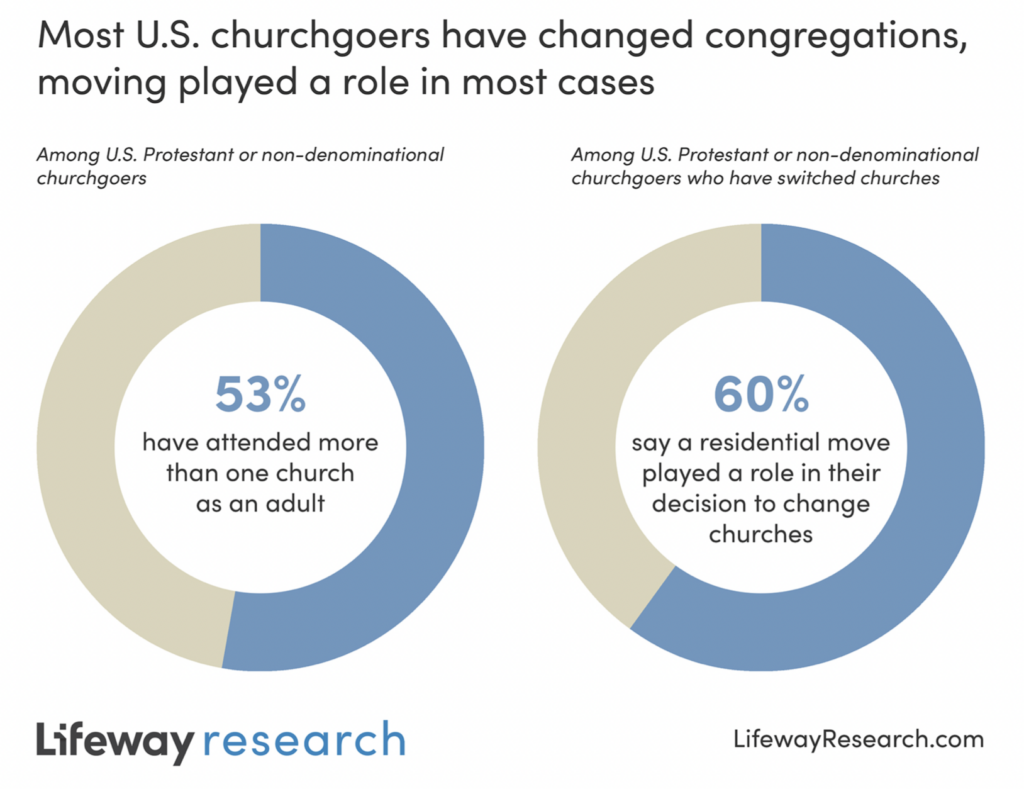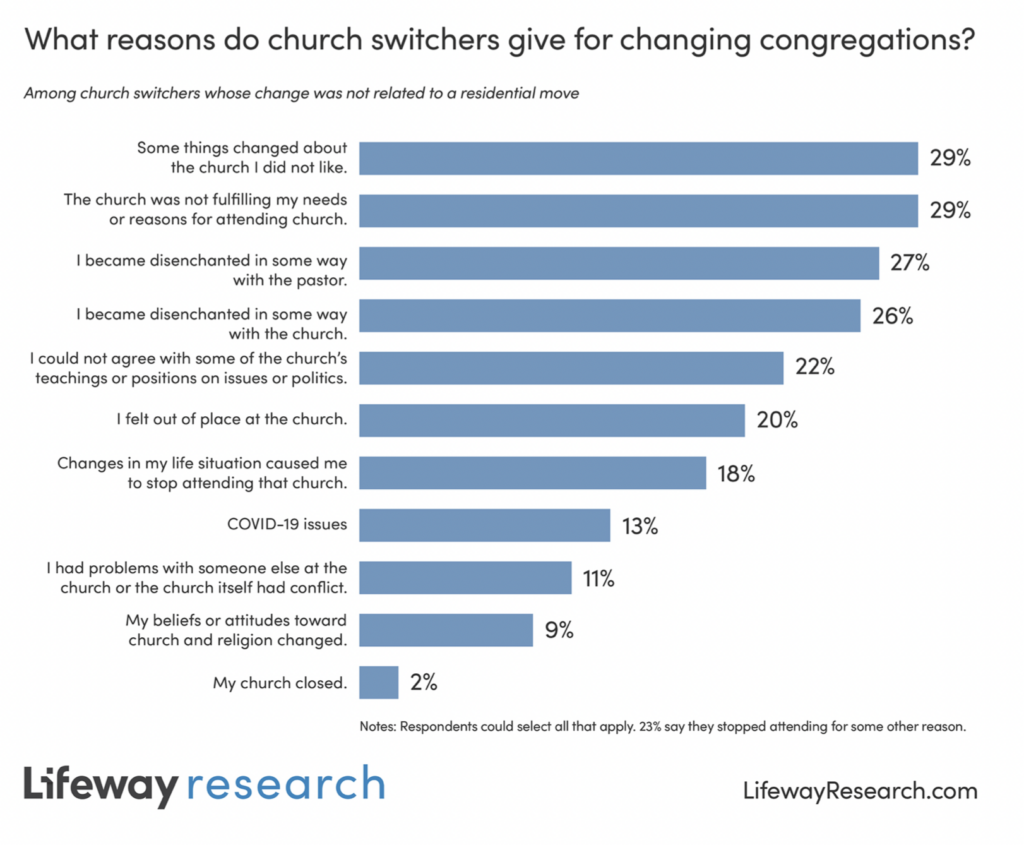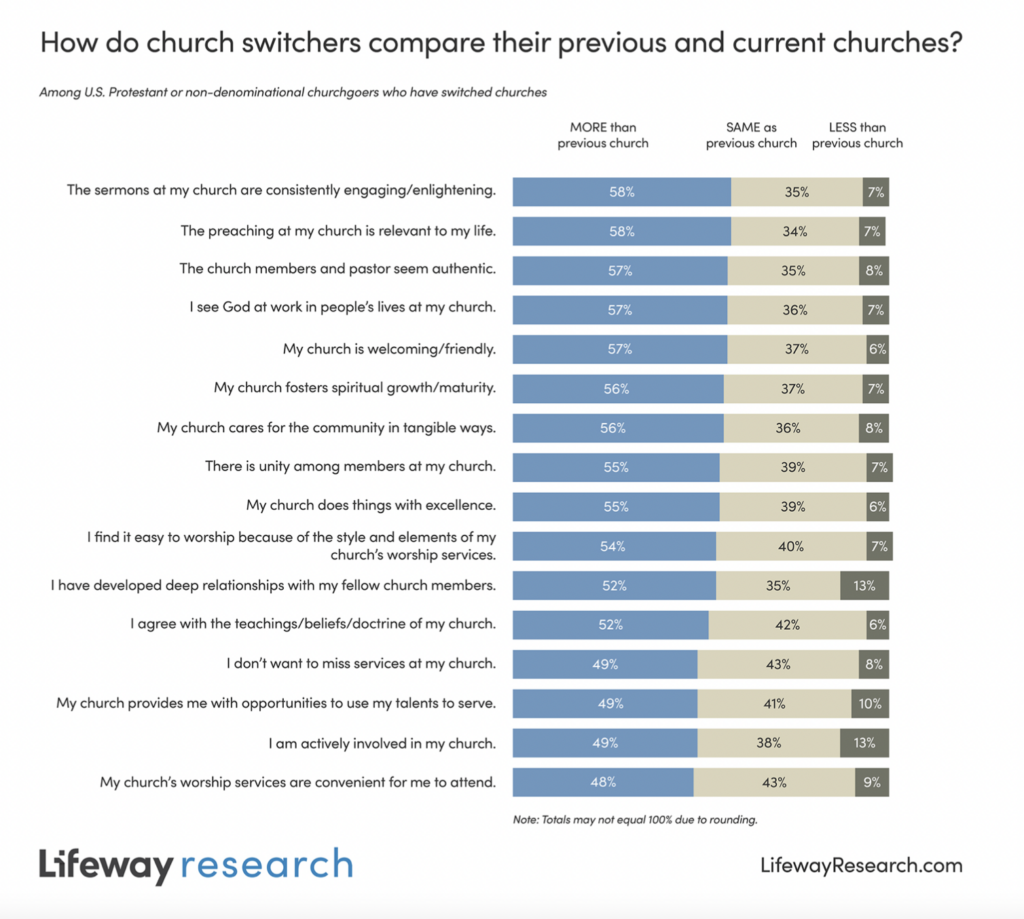Church Switchers Highlight Reasons for Congregational Change
When churchgoers find a new congregation, most say their reasons for church switching had a little to do with both the old and new churches.

When churchgoers find a new congregation, most say their reasons for change had a little to do with both their old and new churches.

Manuel Hodel photo | Unsplash
Lifeway Research studied 1,001 U.S. adults who identify as Protestant or non-denominational, attend church worship services at least twice a month and have attended more than one church as an adult.
During the research screening process, it was determined 53% of U.S. regular churchgoers say they have attended more than one church as an adult. Among those who have switched congregations, 63% say they’ve regularly attended only two to three churches as an adult, while another 22% have attended four to five congregations. Fewer say they’ve been active at six to seven churches (8%), eight to nine (3%) or 10 or more (4%).
For most of those changing churches, changing homes was a factor. Three in 5 church switchers (60%) say a residential move impacted their decision to leave their previous church and begin attending a new one.

“The reason pastors and churchgoers talk about church switchers is because it is not a negligible number of people changing churches,” said Scott McConnell, executive director of Lifeway Research. “However, chronic church switching is not the norm. The biggest group of churchgoers are those who have been at the same church throughout their adult lives, and the next biggest group are those whose church changes were necessitated by moving too far to attend their previous church.”
Same place, new church
Still, 40% of church changes were driven by something other than a residential move. When examining reasons people switched to a new congregation without moving, several factors stand out.
More than 1 in 4 church switchers say they changed because some things changed about the church they did not like (29%), the church was not fulfilling their needs or reasons for attending church (29%), they became disenchanted in some ways with the pastor (27%) or they became disenchanted with the church (26%).
For 22%, the change happened because they could not agree with some of the church’s teachings or positions on issues or politics. Around 1 in 5 say they felt out of place at their previous church (20%) or changes in their life situation caused them to stop attending (18%).
Access to MinistryWatch content is free. However, we hope you will support our work with your prayers and financial gifts. To make a donation, click here.
Issues related to COVID-19 drove 13% of church switchers to find a new congregation. Around 1 in 10 say they left because they had problems or conflicts with someone else at the church or the congregation itself had a conflict (11%) or their beliefs or attitudes toward church and religion changed (9%). For 2%, they had to find a new church because their previous one closed. Another 23% say they stopped attending for other reasons.
“The typical person changing churches has multiple reasons for making this change,” said McConnell. “Broadly speaking people leave a church when they disagree with change, are disgruntled or disagree with the church’s positions. It is much less common to see people leaving because their own religious beliefs changed.”
For each of the reasons given by those whose church change was not the result of a residential move, more specific church-switching justifications exist.

Changes in the church
Among the 29% who say they changed churches because the church itself changed, more than half (53%) say too many things in general changed. Around 2 in 5 (39%) say the church’s teachings on political or social issues changed in ways they didn’t agree with. For 1 in 3, the church’s religious teachings or beliefs changed in ways they didn’t agree with (34%) or the pastor or church staff they liked left the church (33%).
Unfulfilled needs
For the 29% who say they switched due to the church not fulfilling their needs, most (62%) say their previous church was not helping them to develop spiritually. For 2 in 5 (41%), they did not feel engaged or involved in meaningful work in the church. Around a quarter say they did not become friends or close with anyone at the church (27%), the church did not help them find happiness (26%), the church did not help them find answers to questions in their life (22%) or no one seemed to care about their situation or problems (22%).
Pastoral problems
The 27% who left their previous church due to the pastor have a mix of complaints. They’re most likely to say the pastor seemed hypocritical (36%). A third (33%) say the pastor was not a good preacher. Around 3 in 10 say the pastor was judgmental of others (30%) or seemed insincere (29%). Close to a quarter say the pastor had a moral or ethical failure (24%) or had no clear purpose or vision (23%).
Congregational disappointments
Among the 26% who switched after being disenchanted with their previous congregation, 32% point to members being judgmental of others, 30% say members seemed hypocritical, 29% believe the church didn’t really seem to be a place where God was at work, 29% say the church settled for mediocrity and 26% believe the church was run by a clique that discouraged others from getting involved.
Teaching and issue disagreements
More than 1 in 5 (22%) of those who left a congregation for non-residential move reasons say it was related to the church’s teaching or position on issues. The specific reasons under that category paint a complicated picture. One in 3 (33%) say the pastor or church seemed aligned with a particular political party or ideology. Another 31% point to teachings on theological issues, 26% to teachings on applying the Bible to life issues and 24% to teachings on moral issues. For 28%, their previous pastor or church was too liberal for their taste, while 23% say their previous pastor or church was too conservative. Additionally, 22% say the church was too politically active, while 8% say the congregation didn’t engage in politics enough. More than 1 in 5 say their pastor expressed woke opinions (22%) or ignored injustice (22%). One in 5 (20%) say they felt judged based on their political views.
Out of place
For the 20% who say they felt out of place at their previous church, the top reason was because they had a different view of church or religion than the other members (43%). Many also said their home or family situation was different than most members (30%), they felt out of place in terms of social class or education (28%) or most other members were a different age than them (23%). Few say they left because most other members were of a different ethnicity (6%).
Life changes
Among the 18% who say life changes pulled them away from their previous church, 26% say family or home responsibilities prevented them from attending, and 24% point to a work situation keeping them away. Relationship issues played a role for some, including 19% who divorced, separated or were widowed, 17% who were taking or going with someone else who no longer attended, and 11% who got married. Another 15% say illness or infirmity kept them away. Around 1 in 10 say they simply got too busy to attend (11%), they just wanted a break from church (11%) or their children’s activities were on Sunday (8%).
COVID-19
The pandemic contributed to the decisions of 13% of those who changed churches for reasons other than a residential move. The primary reason those churchgoers say they switched congregations is their previous church closed temporarily (55%), and 9% say their church closed permanently. Other reasons revolve around different responses to COVID-19. A quarter (25%) say their previous church focused too much on streaming services. For 21%, their church did not take COVID-19 seriously enough. Almost 1 in 5 (19%) say the church implemented COVID-19 policies they disagreed with, and 15% say the pastor or church expressed an attitude toward COVID-19 that differed from their own. Close to 1 in 10 say the church made no changes due to the pandemic (11%), and 9% say the church argued too much about COVID-19.
Old versus new
Church switchers are slightly more likely to say their decision to change congregations was motivated by a need or desire to join their current church (52%) than to leave their previous one (48%). Understandably, those who changed churches are likely to say their current church is performing better than their previous one.
When comparing their current church and the one they left, more than half of church switchers say their current congregation meets their needs more with sermons that are consistently engaging or enlightening (58%), preaching that is relevant to their life (58%), church members and pastors who seem authentic (57%), being welcoming or friendly (57%), fostering spiritual growth (56%), caring for the community in tangible ways (56%), having unity among members (55%) and doing things with excellence (55%).
Most church switchers also say that at their new congregation more than their previous one they see God at work in people’s lives (57%), find it easy to worship because of the style and elements of the worship service (54%), have developed deep relationships with fellow church members (52%) and agree with the teachings, beliefs or doctrines (52%).
Not quite half say their current church is better at making them feel like they don’t want to miss services (49%), providing them with opportunities to use their talents (49%), being actively involved (49%) and having worship services that are convenient for them to attend (48%).
Many say their current church and previous church are the same in those areas. Only on three topics do at least 1 in 10 church switchers grade their previous church higher—13% say they have fewer deep relationships with fellow church members in their current church; 13% say they are less actively involved; and 10% say their current church provides fewer opportunities to use their talents to serve.
“Almost half of church switchers are motivated by the need to get out of a church they are displeased with. But that doesn’t mean the change won’t impact them for the better,” McConnell said. “While the biggest improvements reported by church switchers are things they receive, large numbers also report that personal spiritual growth, deeper relationships, increased involvement and service resulted from their church move.”

Thinking specifically about preaching, church switchers praise their current pastor’s sermons more when compared to their previous one. Almost 9 in 10 (89%) say the sermons in their current church are clear and understandable, compared to 48% who say the same about their previous church. Similar percentages say sermons at their current church are interesting enough to hold their attention (88%) versus at their previous church (44%). For each issue, church switchers are far more likely to praise their current church’s sermons than sermons from their previous church, including being relevant to their life (85% v. 49%), challenging them to live and think as Scripture teaches (84% v. 43%), teaching them something they didn’t already know (84% v. 43%), focusing on a specific topic (82% v. 44%) and focusing on a specific text from the Bible (81% v. 44%).
Church switchers are most likely to say their current church is the same size as their previous church (56%). Among those who changed church size, however, they’re more likely to move to a larger one (27%) than switch to a smaller church (17%). A statistically significant number moved to a church with more than 250 in worship attendance (27%), compared to those who previously were in such a church and switched (22%).
Half (49%) of church switchers say their previous church had a traditional style of worship, while only 38% say the same about their new congregation. Most of those who switched worship styles made their way to a congregation with a mix of contemporary and traditional, as 30% say that mix described their previous church and 39% say it describes their current one. Additionally, 20% say their previous congregation was contemporary, and 23% say the same about their new one.
Committed to the current congregation
Those who have left one church and joined another seem to be as bought in or more so in their current congregation as their previous one. Almost 3 in 4 (73%) say they formally joined or became members at their current church, similar to the 71% who say they did the same at their previous congregation.
Church switchers are more likely to say they are involved in their current church compared to their previous one in several ways, including attending worship services in person (76% v. 59%), being a consistent financial supporter of the church (66% v. 51%), volunteering when opportunities arise (60% v. 43%), attending a small group (56% v. 41%) and holding a non-leader position with regular responsibilities (47% v. 35%). They are just as likely to say they held a leadership position at their previous church (34%) as they are to say they are holding a leadership position at their current church (34%). Church switchers are more likely to say they serve on a church council or board at their current church (33%) compared to their previous one (25%).
Most church switchers seem to believe their switching days are behind them now. Almost 4 in 5 (78%) say they plan to continue attending the same church in the foreseeable future. Close to 1 in 5 (19%) say they plan to continue attending the same church, but they’re open to switching in the future. Few (3%) say they are actively looking for a new church.
“The lack of engagement among members often concerns pastors. Ironically, one thing that appears to spur some people to get more involved at church is leaving to go to a new church,” said McConnell. “While few pastors would encourage such a move, challenging people to focus less on what displeases them and instead investing in relationships and serving others is a journey worth taking.”
This article was originally published by Lifeway Research.



